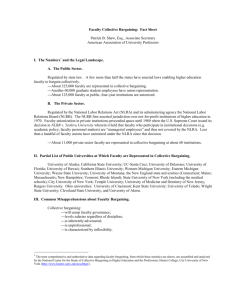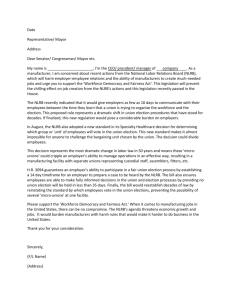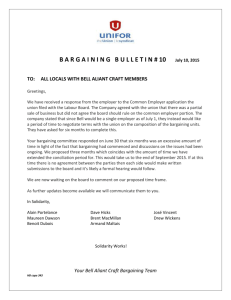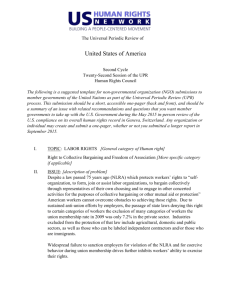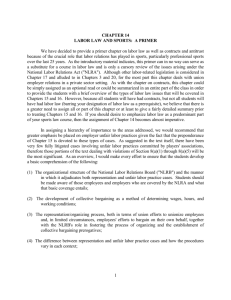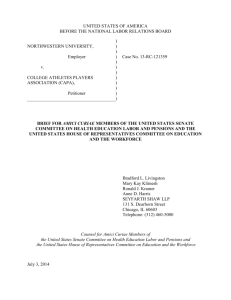Panel Remarks of Richard A - the Commission for Labor Cooperation
advertisement
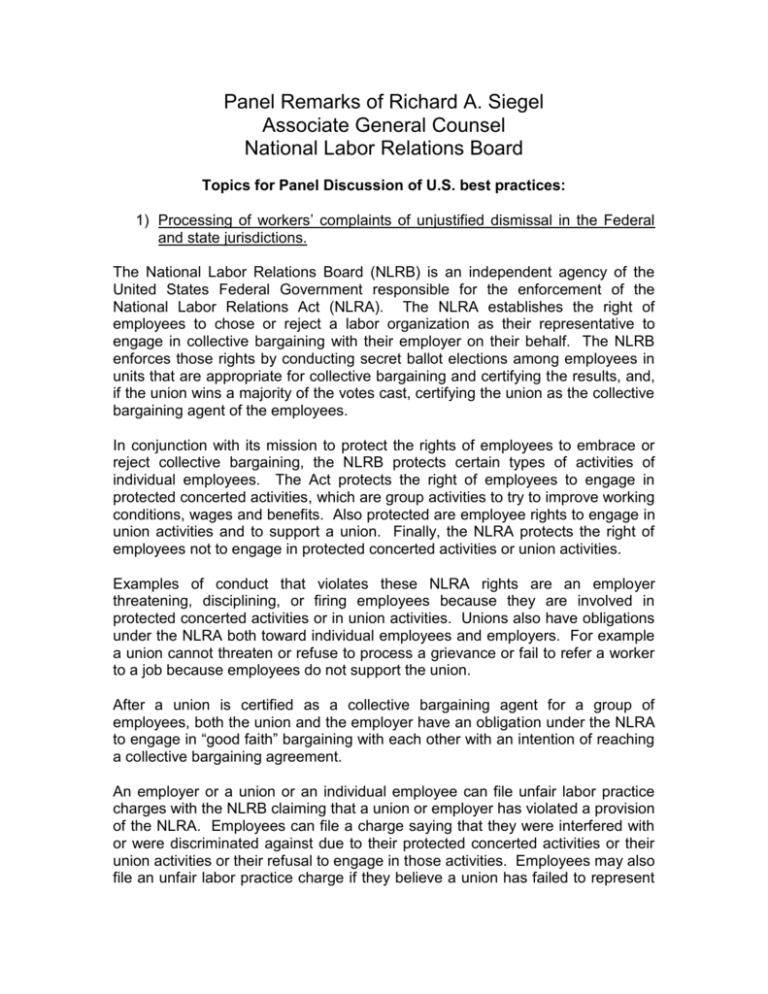
Panel Remarks of Richard A. Siegel Associate General Counsel National Labor Relations Board Topics for Panel Discussion of U.S. best practices: 1) Processing of workers’ complaints of unjustified dismissal in the Federal and state jurisdictions. The National Labor Relations Board (NLRB) is an independent agency of the United States Federal Government responsible for the enforcement of the National Labor Relations Act (NLRA). The NLRA establishes the right of employees to chose or reject a labor organization as their representative to engage in collective bargaining with their employer on their behalf. The NLRB enforces those rights by conducting secret ballot elections among employees in units that are appropriate for collective bargaining and certifying the results, and, if the union wins a majority of the votes cast, certifying the union as the collective bargaining agent of the employees. In conjunction with its mission to protect the rights of employees to embrace or reject collective bargaining, the NLRB protects certain types of activities of individual employees. The Act protects the right of employees to engage in protected concerted activities, which are group activities to try to improve working conditions, wages and benefits. Also protected are employee rights to engage in union activities and to support a union. Finally, the NLRA protects the right of employees not to engage in protected concerted activities or union activities. Examples of conduct that violates these NLRA rights are an employer threatening, disciplining, or firing employees because they are involved in protected concerted activities or in union activities. Unions also have obligations under the NLRA both toward individual employees and employers. For example a union cannot threaten or refuse to process a grievance or fail to refer a worker to a job because employees do not support the union. After a union is certified as a collective bargaining agent for a group of employees, both the union and the employer have an obligation under the NLRA to engage in “good faith” bargaining with each other with an intention of reaching a collective bargaining agreement. An employer or a union or an individual employee can file unfair labor practice charges with the NLRB claiming that a union or employer has violated a provision of the NLRA. Employees can file a charge saying that they were interfered with or were discriminated against due to their protected concerted activities or their union activities or their refusal to engage in those activities. Employees may also file an unfair labor practice charge if they believe a union has failed to represent Remarks of Richard A. Siegel Associate General Counsel National Labor Relations Board -2- them. In addition, an employer or union can file a charge claiming a refusal by the other to engage in “good faith” bargaining. A Board agent at any of the NLRB’s 51 office around the United States will help parties file charges if requested. There is no filing fee. A Board agent in the field office is then assigned to investigate the charge. Sworn statements are taken from the employee or union or employer representative and any witnesses they wish to present. Relevant documentary evidence is received. The employer or union that is named in the charge is asked to provide its defense. The Regional Director of the office in which the charge is filed will then make a decision to dismiss or issue a complaint based upon the evidence uncovered in the investigation and upon the law. If the NLRB Regional Director agrees that there has been interference or discrimination due to employees engaging in protected concerted activities or union activities or due to a refusal to engage in those activities, he or she will try to settle the case before issuing a complaint and going to trial. Settlement may include reinstatement, payment of lost wages, reversal of the improper conduct, and/or posting of a notice advising employees in the workplace of their rights. If a trial is necessary, a field attorney of the NLRB may ask workers and others to testify before an administrative law judge. The NLRB does not charge for these services, and NLRB attorneys will present the case to the administrative law judge. However, any party may have its own attorney take an active role in the hearing. Historically, about 35 percent of all charges filed with the NLRB are found to warrant further proceedings – settlement efforts or complaint and hearing. Over 90 percent of those cases are settled. Of the cases that go before an administrative law judge and the Board, around 80 percent result in violations being found. Most parties comply with Board orders requiring some action on their part to remedy the unfair labor practices found. In a limited number of cases, only 103 in fiscal year 2008, the Board’s order is challenged before the United States Court of Appeals. Many, but not all, of the 50 individual states comprising the United States have statutes governing labor relations and union activities. In most cases these statutes establish authorities like the National Labor Relations Board to enforce their provisions. The jurisdiction of the national Board is extensive, but not exclusive. The NLRB exercises authority under the Interstate Commerce clause of the U.S. Constitution. In order for a labor dispute to fall within the jurisdiction of the NLRB the enterprise involved must be engaged in interstate commerce. In addition, there are discretionary standards of commercial activity that must be satisfied to justify the engagement of the Federal authority. There are a variety of tests employed to determine whether the NLRB will assert jurisdiction. In addition, the Board has authority to refuse to entertain disputes in industries that are particularly local in character. For example, the Board declines to hear cases arising in the horse racing industry. However, where the Board decides to Remarks of Richard A. Siegel Associate General Counsel National Labor Relations Board -3- exercise jurisdiction, its authority is preeminent and controls over any state authority. Many of the state statutes in place are very much like the NLRA. These laws will cover employees of employers that do not fall under the NLRB’s statutory or discretionary jurisdiction. Many local authorities will look to NLRB precedent when deciding cases under their statutes. 2) transparent procedures for the registration of unions in the Federal and state jurisdiction. The National Labor Relations Act defines the term “labor organization” for purposes of the Act’s provisions. For our purposes, a labor organization is any organization of any kind, or any agency or employee representation committee or plan, in which employees participate and which exists for the purpose, in whole or in part, of dealing with employers concerning grievances, labor disputes, wages, rates of pay, hours of employment, or conditions of work. An organization does not need to have any national affiliation, need not be registered with any governmental body or possess any particular constitution or by-laws to be considered a “labor organization.” The National Labor Relations Board does not register unions. 3) access to collective bargaining agreements in the Federal and state jurisdictions. While the purpose of the National Labor Relations Act is to encourage the practice of collective bargaining, the Act does not require that an employer and the union that represents its employees actually reach agreement. There may be situations where parties engage in good faith bargaining but are simply unable to reach an agreement. If either the union or employer who are engaged in this bargaining file an unfair labor practice charge claiming that the other is not bargaining in good faith we will examine the conduct of that party both at the bargaining table and away to determine whether their conduct is at odds with good faith bargaining principles as established in the jurisprudence of the Board and Courts over the years. If we do not find evidence of bad faith, we will not prosecute the case. If our investigation discloses that a party has engaged in bad faith bargaining in violation of the NLRA, we will attempt to achieve a remedy for the violation by voluntary settlement. If we are unable to settle the matter, we will issue an unfair labor practice complaint and set the matter for hearing before an administrative law judge. If, after hearing and briefing, the ALJ finds a violation, the Judge will issue an opinion and recommended order with remedial Remarks of Richard A. Siegel Associate General Counsel National Labor Relations Board -4- provisions. The party against which the order is entered my file an appeal with the five member Board in Washington. If the Board agrees with the Judge, it will adopt his order. The responding party must then comply or file a appeal in a U.S. court of appeals. As noted below, the NLRB and the Federal Mediation and Conciliation Service (FMCS) do cooperate to ensure that an employer and the union representing its employees have access to expert resources to assist them in collective bargaining. Under the Labor-Management Act of 1947, FMCS provides free mediation services in contract negotiation disputes between employers and their unionized employees. All the parties have to do is make a request. The NLRB will not seek access to collective bargaining agreements or collect them except where the terms of an agreement are relevant to an investigation of an unfair labor practice charge or representation petition. I am not aware of any state programs that require the filing or registering of agreements negotiated in their jurisdictions. 4) labor-management cooperation mechanisms in the Federal and state jurisdiction. As noted, the FMCS and the NLRB cooperate regularly to promote collective bargaining. When the NLRB conducts a representation election and a union is certified as the bargaining agent in a unit of employees, we will provide the FMCS with a copy of that certification. The Service will then be able to advise the parties that their assistance is available to them during the course of their negotiations. In FY 2007, FMCS mediators were actively involved in over 5,300 collective bargaining contract negotiations in every major industry throughout the United States. The NLRA also has two provisions that expressly require a party to deal with the FMCS or risk committing an unfair labor practice. Specifically, when a party to a contract wishes to terminate or modify the agreement it must serve a written notice upon the other party to the contract of the proposed termination or modification sixty days prior to the expiration date of the agreement. It must offer to meet and confer with the other party for the purpose of negotiating a new contract or a contract containing the proposed modifications; and it must notify the Federal Mediation and Conciliation Service of the existence of a dispute. This notification permits the Service to contact the parties and attempt to mediate their contract dispute. In addition, before a labor organization engages in any strike, picketing, or other concerted refusal to work at any health care institution, it must, not less than ten days prior to such action, notify both the institution and the Federal Mediation and Conciliation Service of that intention. This notification allows the Service to Remarks of Richard A. Siegel Associate General Counsel National Labor Relations Board -5- apply its mediation efforts in an industry where a work stoppage can have an impact that is particularly harmful to the public good. Collective-bargaining agreements usually contain grievance-arbitration provisions under which the parties may submit disputes arising in the work place under the agreement. Under these provisions, it is routine that the dispute is submitted to first-line supervision for resolution and, if the grieving party is not satisfied, to higher levels in management. If grievance adjustment efforts fail, the grieving party then can press the issue to arbitration. In arbitration, an independent party – not aligned with either the union or management will be called upon to resolve the grievance finally, either with or without an evidentiary hearing. Each party will be responsible for their own representation before the arbitrator and usually share the cost of the arbitrator’s fee. As noted above, if an unfair labor practice charge is filed with the NLRB over the same dispute, we will usually defer to the parties’ grievance-arbitration procedure, reserving the right to review the award to ensure that the procedure was fair and regular, the unfair labor practice issue was addressed and that the result was not repugnant to the purposes of the NLRA.
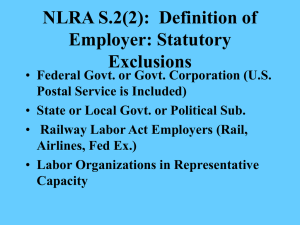
![Labor Management Relations [Opens in New Window]](http://s3.studylib.net/store/data/006750373_1-d299a6861c58d67d0e98709a44e4f857-300x300.png)

